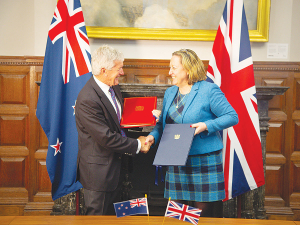Global Dairy Trade prices surge, boosting New Zealand dairy farmers
The latest Global Dairy Trade auction results have delivered a boost to dairy farmers.
 Trade and Export Growth Minister Damien O'Connor and UK Secretary of State for International Trade Anne-Marie Trevelyan signed an FTA last week that will result in close to full liberalisation of all trade.
Trade and Export Growth Minister Damien O'Connor and UK Secretary of State for International Trade Anne-Marie Trevelyan signed an FTA last week that will result in close to full liberalisation of all trade.
OPINION: Last week New Zealand dairy farmers woke up to fantastic news on two consecutive days.
The first was the early morning signing of a free trade deal between New Zealand and the United Kingdom in London.
The second was the Global Dairy Trade (GDT) price index rising for the fifth straight time; more importantly whole milk powder and skim milk powder, used by processors to set the milk price, posted solid gains.
The two doses of good news come as farmers grapple with issues including rising costs, a pandemic and a looming levy/tax on greenhouse gas emissions.
With the world the way it is right now, the trade deal and a strong forecast milk price give farmers reason to be reassured good things do still happen.
The FTA with the UK will result in close to full liberalisation of all trade. About 60% of NZ’s current dairy trade will enter the UK duty free at the start of the FTA, 99.5% within 5 years, and 100% within 7 years.
Tariffs will be eliminated over 5 years for butter (export value $1.6 million) and cheese (export value $500,000), with significant new duty-free quotas that will allow trade to grow during the transition period, until all tariffs and quotas are eliminated.
Many other dairy products will also become tariff free at entry into force, with the remainder eliminated over 3 or 7 years. This opens a significant dairy market that New Zealand exporters have long been effectively locked out of due to high tariffs.
Farmers will be looking forward to the deal pumping more money through the farm gate. Right now a record milk price is on the cards for all NZ dairy farmers.
Dwindling milk production in NZ and around the world is pushing prices up; the fallout from the war in Ukraine is also causing jittery buyers to pay higher prices and stockpile dairy products.
However, the global sanctions against Russia, a major producer of oil and gas, are also pushing fuel prices up. Farmers are facing steep prices increases for fertiliser and other inputs. Interest rates are also rising.
Farmers are astute business people: through careful planning they will get through.
The good news is that milk prices are holding up well. Our new FTA with the UK lays the foundation for higher prices in the years ahead. And when dairy farmers do well, New Zealand does well.
Fonterra’s midpoint of $9.60/kgMS represents a cash injection of over $14 billion into NZ’s economy through milk price payments alone.
Fonterra’s impending exit from the Australian dairy industry is a major event but the story doesn’t change too much for farmers.
Expect greater collaboration between Massey University’s school of Agriculture and Environment and Ireland’s leading agriculture university, the University College of Dublin (UCD), in the future.
A partnership between Torere Macadamias Ltd and the Riddet Institute aims to unlock value from macadamia nuts while growing the next generation of Māori agribusiness researchers.
A new partnership between Dairy Women’s Network (DWN) and NZAgbiz aims to make evidence-based calf rearing practices accessible to all farm teams.
Despite some trying circumstances recently, the cherry season looks set to emerge on top of things.
Changed logos on shirts otherwise it will be business as usual when Fonterra’s consumer and related businesses are expected to change hands next month.
OPINION: Fonterra may be on the verge of selling its consumer business in New Zealand, but the co-operative is not…
OPINION: What does the birth rate in China have to do with stock trading? Just ask a2 Milk Company.